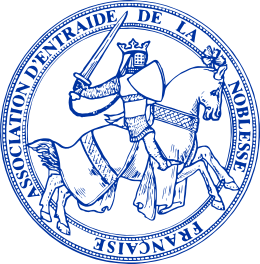News
 Act by which Duke Louis I of Bourbon ennobles and grants coats of arms to two knights, February 22, 1334
Act by which Duke Louis I of Bourbon ennobles and grants coats of arms to two knights, February 22, 1334
List of recognitions of French nobility, acquired and transmissible, admitted into evidence
List of recognitions of French nobility, acquired and transmissible, admitted into evidence
In accordance with the Articles of Association, the file of every member of the A.N.F. must contain filial proof, by authentic extracts of the civil status or by notarized contracts, of the ancestry of the holder in direct, male, natural and legitimate line, up to the one of his authors for whom is produced one of the acts appearing in the list below.
Any of these acts establishes that this ascendant was officially in possession of transmissible French nobility.
It is not enough to establish that the author was in possession of a state reserved for nobility or an ennobling office. It is necessary to produce the act, issued by the French sovereign power, officially establishing the author's nobility.
These acts are normally :
- Letters of ennoblement. Letters of confirmation of nobility or surannation. Letters of relief, recognition or ennoblement as required. These letters must be registered and are valid unless revoked. A receipt for the fees paid to avoid revocation has the same value as the letters themselves.
- Hereditary titles granted or confirmed by registered letters patent.
- Decrees of maintenance of nobility by intendants, the King's Council, Sovereign Courts (Parliaments, Chambres des Comptes, Cours des Aides) and Superior Councils (Alsace, Artois, Roussillon, Corsica, Colonies).
- Council rulings dispensing with the golden marc of nobility (edict of December 1770).
- Letters patent from registered noble citizens of Perpignan.
- Certificates from an intendant, a judge of arms of France or a genealogist of the King's Orders, up to 1790, following proofs made for offices or functions requiring nobility: Honors of the Court (carriages); Pages of the Grand and Petit Écuries; Pages of the princes of the Royal Mayors; Military Schools; Chevau-légers; Sous-lieutenances (edict of May 21, 1781); Demoiselles de Saint-Cyr.
- Convocations by letters of seal, authentic certificates or original registers of entries into the Order of Nobility at the States of Artois, Burgundy, Brittany, Languedoc and Provence.
- Letters of honor or of vetérance attesting to the acquisition of nobility transmissible by the exercise of offices or positions.
- Certificates required by the edict of 1750 concerning military nobility.
The council may also consider as a recognitive act, but only for families in possession of nobility status prior to 1790:
- Appearance in the order of nobility (or given default) at assemblies for the election of deputies to the Estates General in 1789;
- The certificate of admission, before 1790, to the orders and chapters listed below: Saint-Esprit, Malte, Saint-Georges en Franche-Comté, Saint-Lazare, Saint-Jean de Lyon, Brioude, Baume-les-Messieurs, Lure, Saint-Claude, Saint-Pierre de Mâcon, Saint-Pierre de Vienne, Strasbourg; Remiremont, Épinal, Alix, Leigneu, Laveine, Lons-le-Saunier, Andlaw, Baume-les- Dames, Migette, Neuville, Poussey; to the exclusion of all other orders and chapters and of entries not accompanied by the aforementioned certificate.
- The candidate must justify his male descent to the author of nobility established by the above proofs.
- The sentences of the elected officials on the fact of the sizes specifying the exemption by virtue of an acquired nobility.
- Families from countries annexed since 1789 retain their status and prove their nobility by producing the proof required in their country before annexation.
Simple qualifications (noble, esquire, knight, etc.), mere possession of status, certificates of nobility given by gentlemen, or the general terms of edicts conferring collective nobility, cannot be used as a recognizing act. A fortiori, offices or functions attributing personal nobility cannot be retained as a recognitive act: bodyguards, musketeers, gentlemen of the King's household and chamber, stable squires and other commensals.
Files must contain photographs of deeds produced whose originals are not in a public repository.
The Chairman and the Committee
Bulletin n°18 - April 1937









